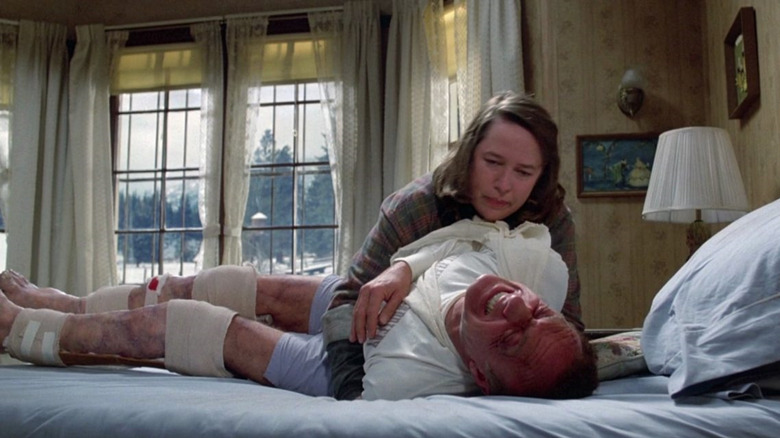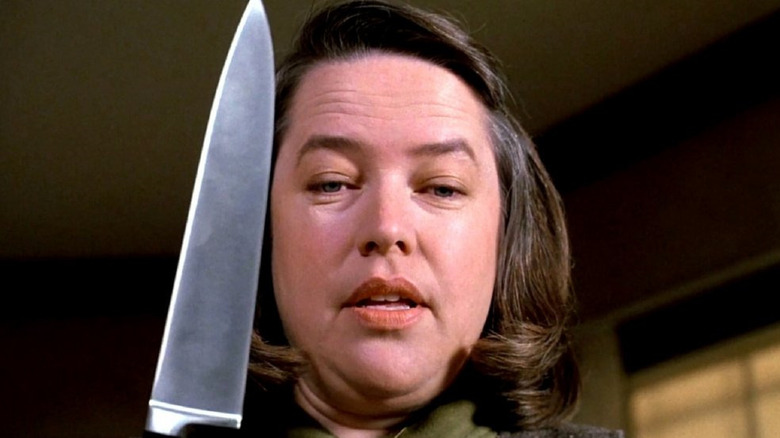There Was More To Kathy Bates' Misery Character Than The Audience Saw On Screen
"Misery" was Kathy Bates' first big film. Rob Reiner's adaptation of the hit Stephen King novel came in 1990, early on in Bates' five-decade career. "Misery" would precede "Fried Green Tomatoes," King adaptation "Dolores Claiborne," "Titanic," and other films she'd become known for; arguably, her recent five-year run (in various roles) on Ryan Murphy and Brad Falchuk's "American Horror Story" series has become the genre work she's best known for. But before all of that, she took on the role of one of cinema's greatest villainesses since Nurse Ratched.
As written in King's 1987 novel, Annie Wilkes is an obsessed fan (a stan even, in the Eminem sense) who rescues romance novelist Paul Sheldon (James Caan) from a blizzard-induced car crash. She brings him to her isolated homestead in Sidewinder, Colorado where it soon becomes clear that this Airbnb is something like Hotel California: he can check out anytime he likes, but he can never leave. As Sheldon's captor, Wilkes swings between manic extremes, professing her love one moment and threatening life and limb the next.
In an interview with the New York Times, Bates got into the creative process behind becoming Annie. It was a labor of love, one where she participated in the common thespian practice of filling out further backstory for her character. This informal profile is intangible to the audience, but informs Bates' performance and line delivery for their benefit. Bates shared that she and Reiner believed that Annie Wilkes had been sexually molested as a child by the first "dirty birdie" she encountered — her father. Such a suggestion is nowhere to be found in the movie, but it does add a layer of depth to the unstable antagonist who was ranked 17th on AFI's Top 100 Heroes and Villains list.
Dirty birdies
"Sometimes my thinking is a little muddy — I accept that."
When Annie Wilkes delivers the above line in "Misery," she's speaking frankly, hyper-aware of her own mental instability. Still, she charges ahead with holding the adored author captive as a modern Scheherazade, compelling him rewrite his next novel to her satisfaction — or else. That "muddy thinking" is what led to Annie's stalking Paul in the first place, then kidnapping him, then hobbling him to keep him from wandering around. But the madness didn't start with Sheldon.
Late in the film, Paul snoops around and opens up one of Annie's scrapbooks, which is how he learns that Wilkes is an angel of death nurse known to the press as "Dragon Lady." She has murdered a lot of people, either as a means to an end or simply because she's a homicidal infant-killing maniac. This revelation creates a further sense of urgency for Paul to exit stage left before he becomes her next victim; by this point, she's already brandished a pistol in front of him and threatened to add bullets once he inevitably heals from his crash-related injuries.
Before that reveal, a briefly-shown page in the scrapbook contains a newspaper clip announcing the death of banker Carl Wilkes alongside a Father's Day card and a funeral remembrance card. The article describes the death as a "freak accident" that left his crumpled body at the bottom of a staircase, discovered by his 11-year-old daughter Annie. Bates and Reiner give reasonable motivation for her to put his body there in the first place. King's novel mentions Carl Wilkes, and though he does die in a tragic stair fall, Annie is credited for the big shove.
Now — as Kathy Bates would tell it — we know why.

